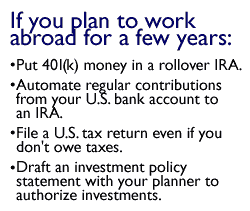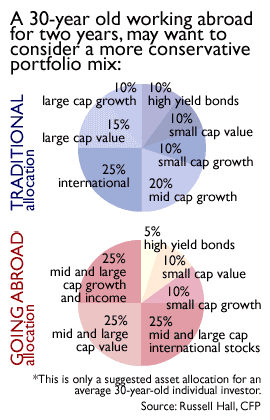|
IRA saving from far away
|
 |
March 24, 2000: 3:02 p.m. ET
How to plan your retirement funding when you take a job out of the U.S.
By Staff Writer Jennifer Karchmer
|
NEW YORK (CNNfn) - When Mary Robbins, 30, moved to Sapporo, Japan, to teach English, she left behind her friends, family, and her car -- but she didn't forget about her retirement savings.
When not drinking sake or instructing Japanese businessmen on grammar rules, Mary regularly sent home contributions to keep the account growing.
"Find a way to put it away," she said after saving about $24,000 while working overseas for two years.
Financial experts say Mary did the right thing by contributing regularly to her long-term piggy bank rather than letting the cobwebs set in.
So if you're educating villagers about disease in Zimbabwe, or working for your corporation in Belgium for a few years, you don't have to put your retirement plan on the back burner.
Roll it on over
Kyra Morris, a certified financial planner in Mt. Pleasant, S.C., advised a husband-and-wife team who traveled to Africa as medical missionaries. Morris suggested that before they leave the United States, they each take their employer-sponsored 401(k) plans and put them into a rollover IRA, which is similar to a traditional IRA: it's tax deductible and you can contribute up to $2,000 a year.
Click here for an explanation of a rollover IRA from Fidelity and Vanguard.
The rollover IRA gives you the flexibility to roll the money back into a qualified plan, such as a 401(k) or a Roth IRA, when you return to the United States, Morris said.
But it's important to note that if you're earning less than $74,000 overseas, you will receive a tax deduction from the IRS. Therefore, you cannot make tax-deductible contributions to an IRA.
Instead, Morris suggests creating some type of long term savings plan with mutual funds or a brokerage account to put money away while abroad.
The bottom line should be to make contributions to a savings plan because "it sets lots of good patterns to save for the long term."
Put your portfolio on automatic pilot
So how do you keep an eye on your long-term retirement plan at home if you're working thousands of miles away for a few years?

Depending on where you're located and what kind of work you do, you may not be able to track your investments regularly or keep an eye on the U.S. markets.
But this might not be a bad thing. Many financial experts say you shouldn't be re-allocating your retirement portfolio more than once a year anyway.
"The idea is to try to put your savings plans on automatic pilot," said Joel Ticknor, a fee-only planner in Reston, Va. "The easiest thing is to make arrangements with your bank and broker to have automatic allotments," to your IRA.
Balance the scales
If you're digging latrines in a Third World country, you may not even have access to a phone, let alone an Internet connection through which you can monitor the Dow Jones industrial average. So while working abroad, you may sleep better at night with a slightly more conservative investment mix, since you'll probably be out of touch with the U.S. markets.
Certified financial planner Russell Hall with Sun America Securities in Wichita, Kan., suggests balanced funds that mix stocks and bonds. These investments can offset international or other risky exposure in your portfolio.
He suggests the Putnam Fund for Growth and Income (PXGIX) and the American Century Balanced Fund (TWBAX).

"If the young person came to me now, and they're going overseas, and they're unreachable within 24 hours by phone, I would set up a system of more conservative types of funds," Hall said.
Don't forget the tax man
After graduating from college in 1991, Kevin Otsuka worked in Honduras helping small businesses set up computer accounting systems.
As a Peace Corps volunteer, he received a $100 monthly living stipend for rent, food, and other daily living expenses while living in San Pedro Sula. On such a tight income, it was tough to stash away any savings, so his mind wasn't on retirement. But the tax man came to find him. Although not living in the United States, Kevin was required to file U.S. taxes with the IRS.
Click here for more information on tax considerations of income earned abroad.
Americans working overseas receive a tax credit for U.S. earned income of up to $74,000. The bottom line is, "you should be filing a return," Morris said.
Another go 'round?
Today, at 30, Kevin, a statistical analyst in San Diego, is considering another stint with the Peace Corps, but this time he would have a better plan for his existing long-term account.
"If I did it now, retirement savings would be more at the forefront of my mind," he said. "I would roll over my existing 401(k) into an IRA."
So retirement savings don't have to take a backseat while you're away learning new languages or helping residents in poorer countries, financial planners say.
If you're a U.S. gov't employee stationed abroad, click here.
"It's fun. Enjoy your time over there," said Ticknor, who worked with the State Department overseas for 30 years before returning to the United States and becoming a financial planner. 
-- Click here to send email about this story to Staff Writer Jennifer Karchmer.
|
|
|
|
|
 |

|

